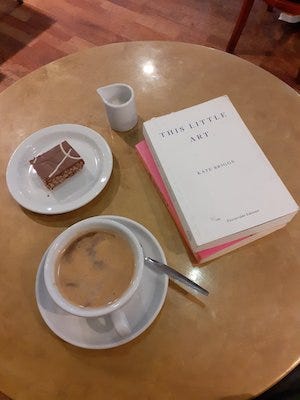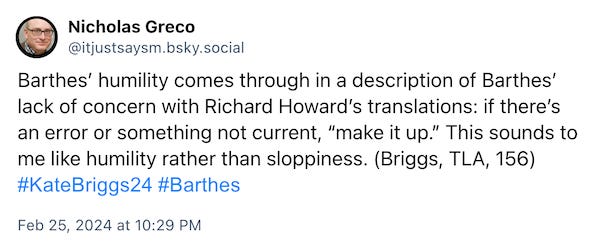Kim and I are excited to hold another video call for those who are able and interested in joining us for round two. Thank you to those who filled out the survey from last week. Based on those results, Saturday, March 16th will be our meeting date, and the time will be 12pm PDT / 3pm EDT / 7pm GMT. (We originally thought the time would be 8pm GMT, but we move our clocks forward in the US before the UK does, and it’s all very confusing. I think I have it right now though.) The meeting will be informal, a chance to meet one another and chat and share thoughts and impressions of our reading. Everyone is welcome to join us, no matter how much of the reading you have or haven’t done, and regardless of whether you filled out the survey or not. No pressure, no judgment, just fun.
I’ll send out a link in a future newsletter. Hope to see you there!
How is your reading going? Let us know.
Kasey Jueds’s photo with a favorite haiku:
Winter solitude—
in a world of one color
the sound of wind.
Basho, trans. Robert Hass
Schedule
Here’s our schedule for the upcoming week:
Resources and Links
From Rebecca Cullen, a really great, thoughtful post on her recent Barthes and Briggs reading.
Kim’s #KateBriggs24 website has a wealth of information and links, as well as our complete schedule.
Kate Briggs recently recommended a book called Group Works: Art, Politics, and Collective Ambivalence by Ethan Philbrick, from Fordham University Press. I haven’t read it yet, but it’s now sitting on my shelves, ready for when I get the chance.
Thanks to Chris Clarke’s tweet, I learned about a new book called Experimental Translation: The Work of Translation in the Age of Algorithmic Production by Lily Robert-Foley. It looks like it might interest Kate Briggs readers.
Don’t miss really great comments from last week’s post from Kasey, Nicholas, and Catherine. And there are more over there I haven’t linked to!
Discussion
Various social media posts from our readers:
From Anindita Basu Sempere:
From Nora:
From Adam James Smith:
From Catherine:
From Slnieckar:
From Nicholas Greco:
Thank you all for your company and your comments!
Find Kim on Twitter, Bluesky, and Instagram*
Find Rebecca on Twitter, Bluesky, and Instagram*
*Our Instagram accounts are locked, but we welcome bookish friend requests.














TLA, p. 174-181: I love this quotation: "The right to identify-with without risking the presumptuousness of comparing-oneself-to: is this not one of the basic freedoms of reading?" and I also love the fact that on the very next page, Briggs writes that maybe it's not identification she feels after all -- a questioning, refining, clarifying, swerving move she makes all the time. Following her, I feel identification in one moment -- genuinely feel it, and the word feels right, and then the next moment I agree that identification isn't quite it, or isn't all of it. That it's wanting to be with as well, or instead. I suppose how we feel about authors is so complicated, multivalent, changing, that both of these attitudes towards authors are true, perhaps true at different times. To at times feel the same as, in the same position as, and at other times to feel next to, or even opposed to (p. 181), in a productive way. I love Barthes's question, "What do I want, wanting to know you?"
TLA, p. 168-173: "I would argue that this is what reading offers us: occasions for inappropriate, improbable identification. For powerful reality-suspending identification with a character, a writer, an idea, an experience, a fantasy." I'm so interested in the way the question Briggs gets on p. 169 surprised her, or struck her: have you ever felt excluded working on Barthes? The question seems well-meant -- I can imagine asking it myself, although hopefully I won't ask it going forward. How do you feel translating a work by a man writing about other men? Do you feel excluded from his fantasies? A lot of people might actually feel excluded in this situation, and understandably so. There's a certain sensitivity in the Briggs persona -- are they telling me I SHOULD feel excluded? -- and also a certain confidence: no, actually, reading is about inappropriate, improbable identifications. It's fantasy we're talking about, I imagine her thinking, and I'm entering the fantasy just as Barthes enters the fantasy, and "belonging" and "exclusion" don't really make sense in this world. What freedom!